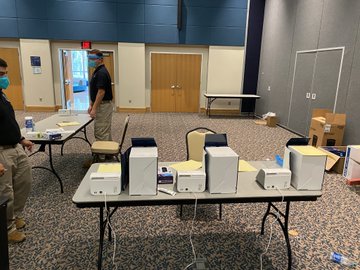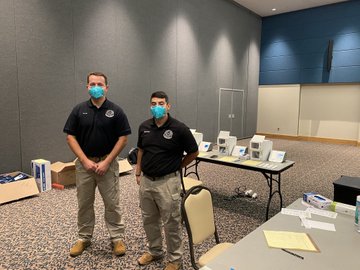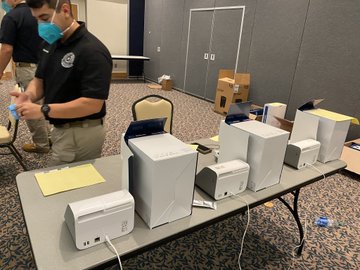joe biden's a very weak candidate. he will probably stumble in the debates. he is not a sure thing by any means.
this is from patrick martin ('wsws'):
Over the past week a curious “groundswell” has taken place in the American media. Former Obama national security advisor Susan Rice, someone who has never run for political office and is largely unknown to the American public, has been promoted in a series of press reports as a likely choice of presumptive Democratic presidential nominee Joe Biden to be his running mate.
The Washington Post led off the barrage with its July 25 profile, headlined, “Susan Rice’s advantage: A long work history with Biden. Former Obama official has emerged as an underdog VP pick.” The article noted that for four years, 2013–2016, Biden frequently began his work day with a national security briefing from Rice, given jointly to the president and vice president in the Oval Office. The two had offices in the same part of the West Wing, and Biden would drop in to Rice’s office at will.
there you go - nominate susan rice!
if you want to give donald trump a 2nd term, nominate susan rice.
no voters wants her. she's never held elected office. she's despised by probably a third of the electorate, but nominate her?
only if you want to donald trump to have a 2nd term.
there is no momentum for joe. the v.p. pick is the only thing that might add excitement. there will be no excitement from nominating susan rice.
let's close with c.i.'s 'Iraq snapshot:'
Wednesday, July 29, 2020. Iraq is slammed with one crisis after another.
Nouri's slaughter. The April 23, 2013 massacre of a sit-in in Hawija which resulted from Nouri's federal forces storming in. Alsumaria noted Kirkuk's Department of Health (Hawija is in Kirkuk) announced 50 activists have died and 110 were injured in the assault. AFP reported the death toll eventually (as some wounded died) rose to 53 dead. UNICEF noted that the dead included 8 children (twelve more were injured).
And where was the US?
Where was the White House?
Did they immediately demand justice? Or that Nouri step down? Or express solidarity with the protesters?
No, they just looked the other way and continued holding hands with Nouri al-Maliki.
In fact, at that point they pretty much had their hands down Nouri's pants.
Oh, the Yazidis! Trapped on a mountain top!
But when Nouri's forces killed protesters -- and Hawija is only the biggest slaughter -- Barack Obama was still thrilled to hold hands with the man he installed in 2010.
Because Nouri lost the election.
Despite bribery and bullying, in 2010, he came in second in the elections.
But Barack Obama overturned the election results. And, via the US-brokered Erbil agreement, he gave Nouri a second term.
Liar Patrick Cockburn ignores that as well.
He wants you to know that Iran decreed Nouri would get a second term in October and that's how it happened.
Well if tehran is so damn all powerful, than their decision in October should have been immediately implemented, right?
But that's not what happened is it?
November 10, 2010, The Erbil Agreement is signed. November 11, 2010, the Iraqi Parliament has their first real session in over eight months and finally declares a president, a Speaker of Parliament and Nouri as prime minister-designate -- all the things that were supposed to happen in April of 2010 but didn't.
March 7, 2010, Iraq concluded Parliamentary elections. The Guardian's editorial board noted in August 2010, "These elections were hailed prematurely by Mr Obama as a success, but everything that has happened since has surely doused that optimism in a cold shower of reality."
Bully Boy Bush installed Nouri as prime minister in 2006.
The Iraqi people suffered.
And in 2010, they went to the polls.
And they voted for something other than Nouri.
Despite his bribery, his bullying, the threats and so much more, they voted Nouri out.
But Barack overturned their votes and insisted Nouri get a second term.
So, yes, the Hawija massacre is something Barack bears responsibility for.
Iraq faces many, many problems. There's the coronavirus. Zehra Nur Duz (ANADOLU AGENCY) reported
yesterday, "The Iraqi Health Ministry said 77 people died from COVID-19
over the past 24 hours, pushing the nationwide death toll to 4,535." WORLDOMETER notes Iraq has had 115,332 confirmed coronavirus cases so far. RUDAW Tweets:
The government of France’s most populous region donated 100,000 face masks to the Kurdistan Region’s health ministry on Tuesday as the novel coronavirus pandemic continues to wreak havoc across Iraq.
Iraqi journalist Steven Nabil Tweets about his recent coronavirus test:
The testing was professional and easy, thanks to Texas Army National Guard. thank God the results were negative
1:04 PM · Jul 28, 2020
Coronavirus
has been used in Iraq to crack down on dissent. That's the government
using the disease. It's also been used by terrorist groups -- including
ISIS. Taylor Luck (CHRISTIAN SCIENCE MONITOR) notes:
“From approximately March 2020, the coronavirus disease (COVID-19)
pandemic became a factor in ISIL operational, propaganda, and
fundraising activities,” the U.N. Security Council was warned last week.
ISIS is “consolidating in Iraq and the Syrian Arab Republic,” said a U.N. report to the Council, “and showing confidence in its ability to increasingly operate in a brazen manner in its core area.”
Alarming experts is ISIS’s ability to move freely between eastern Syria and western Iraq – territory that once fell under its “caliphate” – entering towns and villages with relative ease. Its ranks boast around 10,000 fighters, according to U.N. and analysts’ estimates.
“The pandemic came at a time with preexisting conditions on the ground in Iraq and Syria that allowed ISIS to benefit,” says Hassan Hassan, director of the Non-State Actors and Geopolitics program at the Washington-based Center for Global Policy.
ISIS is “consolidating in Iraq and the Syrian Arab Republic,” said a U.N. report to the Council, “and showing confidence in its ability to increasingly operate in a brazen manner in its core area.”
Alarming experts is ISIS’s ability to move freely between eastern Syria and western Iraq – territory that once fell under its “caliphate” – entering towns and villages with relative ease. Its ranks boast around 10,000 fighters, according to U.N. and analysts’ estimates.
“The pandemic came at a time with preexisting conditions on the ground in Iraq and Syria that allowed ISIS to benefit,” says Hassan Hassan, director of the Non-State Actors and Geopolitics program at the Washington-based Center for Global Policy.
ISIS was never
defeated. It was routed out of Mosul -- though Mosul still hasn't been
rebuilt. Routing it out of Mosul wasn't a 'victory.' They never should
have been able to seize Mosul -- let alone hold it for years. In the
time since it was routed out of Mosul, it has remained active. MENAFN reports, "The Iraqi military stated that two Iraqi policemen and a
frontier safeguard were murdered on Tuesday in two assaults by the
Islamic State (IS) militants in western Iraq." Also reporting on Iraq this morning is Lawk Ghafuri (RUDAW):
The Islamic State group (ISIS) has claimed responsibility for the
killing of a top Iraqi army commander in Anbar province, west of Baghdad
in an "ambush" late Tuesday.
In a statement published on ISIS' Telegram propaganda channel, the extremist group claimed its militants "killed General Brigadier Ahmed al-Lami, commander of 7th division of the 29th brigade of the Iraqi Army in an ambush in Anbar."
The statement also claimed that another officer was killed in the ambush which also injured an Iraqi soldier.
Yehia Rasool, spokesperson for the Iraqi commander-in-chief released a statement early Wednesday confirming the death of the “brave commander.”
In a statement published on ISIS' Telegram propaganda channel, the extremist group claimed its militants "killed General Brigadier Ahmed al-Lami, commander of 7th division of the 29th brigade of the Iraqi Army in an ambush in Anbar."
The statement also claimed that another officer was killed in the ambush which also injured an Iraqi soldier.
Yehia Rasool, spokesperson for the Iraqi commander-in-chief released a statement early Wednesday confirming the death of the “brave commander.”
As ISIS rises in Iraq, we need to note this nonsense from Brian W. Everstine (AIR FORCE MAGAZINE):
The U.S. will hand over control of bases in Iraq and is likely to
reduce its overall troop level within the country as progress against
the remnants of the Islamic State group continues, a senior official
with the American-led coalition said.
On July 25, U.S. forces will hand over control of the Besmaya base south of Baghdad to Iraqi forces, and Spain’s training contingent will return home, USAF Maj. Gen. Kenneth P. Ekman, the deputy commander of Combined Joint Task Force-Operation Inherent Resolve, told reporters via videoconference July 22.
“There will be some degree of a reduction in force in Iraq, that’s what success looks like,” he said.
On July 25, U.S. forces will hand over control of the Besmaya base south of Baghdad to Iraqi forces, and Spain’s training contingent will return home, USAF Maj. Gen. Kenneth P. Ekman, the deputy commander of Combined Joint Task Force-Operation Inherent Resolve, told reporters via videoconference July 22.
“There will be some degree of a reduction in force in Iraq, that’s what success looks like,” he said.
Now
if it takes the US government lying that ISIS has been defeated to
finally get all US troops out of Iraq, okay, I can live with others
lying. But even then, I wouldn't just stay silent in the face of those
lies. ISIS has never been defeated. It can't be defeated militarily.
For
a few brief weeks, then-President Barack Obama told some truths about
Iraq. He noted that the problems were the government -- Nouri al-Maliki
was prime minister at the time. He was right. ISIS is a threat to
stability. The Iraqi government has never given the Iraqi people
anything that they'd want to stabilize -- let alone fight to protect.
Early
last October, while working in his office in Baghdad, a businessman
named Hussein Laqees got a phone call from a number he’d never seen
before. “We need to talk,” the caller said. The man’s voice was gruff
and self-assured, a little menacing. He demanded that Laqees come meet
him but refused to give his name.
Laqees
demurred, and the call ended. He might have forgotten the whole
exchange had a colleague not been in touch a few minutes later with
worrisome news. The mystery caller, he said, was from Kataib Hezbollah, a
powerful Iraqi militia with strong ties to Iran’s Revolutionary Guards.
They had a business proposal to discuss.
When
the militiaman called again, Laqees reluctantly agreed to a meeting. He
gathered a few colleagues, and they all drove to a house off Sadoun
Street in downtown Baghdad, arriving near dusk. Inside, he was led into a
dim office and introduced to a small, bald man who got right to the
point. “You need to work with us, there is no other choice,” the bald
man said. “You can keep your staff, but you must do as we say.” He
explained that Kataib Hezbollah would take 20 percent of Laqees’s gross
revenue — about 50 percent of his profits.
Laqees
refused. His company, Palm Jet, had a five-year government contract to
run a V.I.P. terminal at Baghdad’s international airport, along with a
nearby hotel; it also works routinely with Western aeronautics firms
like Lockheed Martin. He could not have any dealings with a group like
Kataib Hezbollah, which is listed by the U.S. government as a foreign
terrorist organization (as is the unrelated Lebanese group also called
Hezbollah). The bald man replied that if Laqees refused, he would seize
everything he owned in Baghdad. Laqees looked at him in disbelief. “I’m
an investor,” he said. “There is law.” The bald man shot back: “We are
the law.” He told Laqees to give him an answer by noon the next day.
The
following afternoon, five Chevrolet S.U.V.s rolled up outside the
V.I.P. terminal. Twelve men got out, dressed in black paramilitary gear
and carrying guns. They found Laqees in the cafe of the airport hotel,
smoking and sipping coffee. He had been calling all his government
contacts since the night before, along with the airport’s department
heads. No one had called back. It was as if they’d been warned — or
perhaps paid off. The militiamen took Laqees’s phone and told him to
sign a document relinquishing his contract. He stalled for time. One of
his employees slipped outside to take a cellphone picture of the
militiamen’s vehicles, but they caught him, smashed his phone and beat
him up. Laqees, who is Lebanese, had been working in Iraq since 2011. He
knew the country was troubled by crime and corruption, but he believed
that the airport, with its hundreds of uniformed immigration and
security officials, was different. “I wait 20 minutes, maybe someone
will come,” Laqees told me later. “Police, something.” Finally, he
walked to the departures hall and caught a flight to Dubai. Days later,
Kataib Hezbollah installed its preferred contractor in his place. Laqees
has not returned to Iraq since.
Worth also notes:
The militias have been aided and abetted
by a new Iraqi political class whose sole ethic is self-enrichment.
Over the years, this cross-sectarian cabal has mastered scams at every
level: routine checkpoint shakedowns, bank fraud, embezzling from the
government payroll. Adel Abdul Mahdi, who was hailed as a potential
reformer when he became Iraq’s prime minister in 2018, hoped to
subordinate the militias to the state. Instead, they outmaneuvered and
overpowered him. His cabinet included people with ties to some of the
worst graft schemes afflicting the country.
The
United States is deeply implicated in all this, and not just because
its serial invasions wrecked the country and helped ravage the economy.
America provides the money that sustains it, even as U.S. officials wink
at the self-dealing of Iraqi allies. The Federal Reserve of New York
still supplies Iraq with at least $10 billion a year in hard currency
from the country’s oil sales. Much of that is passed on to commercial
banks, ostensibly for imports, in a process that was hijacked long ago
by Iraq’s money-laundering cartels. At the same time, the United States
inflicts punishing sanctions on two countries -- Iran and Syria -- with
which Iraq shares notoriously permeable borders. It is the ideal
breeding ground for corruption.
Paddy
Cock-burn. Remember that idiot? What's our non-American Middle East
correspondent writing about right now? Oh, right, propaganda to get
Donald Trump defeated in November. Well, maybe that's better than all
his valentines to Adel Abdul Mahdi. Mahdi was never serious about
ending corruption. If he had been, Worth wouldn't be noting that
Mahdi's "cabinet included people with ties to some of the worst graft
schemes afflicting the country."
It was always
obvious that he didn't know what he was talking about. Elaine called
him out when Bully Boy Bush occupied the White House. An Iraqi woman
was killed because of who she married and there's Paddy Cock Burn
getting the details wrong of a public execution. And THE INDEPENDENT
let him get away with it. He has had one error after another in report
after report, he is known in the Middle East as someone who is
anti-Arab. His most recent laughable book claimed that ISIS was
defeated. He's an idiot. Scott Horton loves Paddy Cocks but that's
part of the reason Scott Horton has been so wrong about Iraq over and
over. Remember, Scott cheered on Nouri al-Maliki, cheered him and
praised him. Nouri was -- and remains -- a thug. He is responsible for
the rise of ISIS in Iraq. But when you get your information from
professional liar Paddy Cock Burn, you're going to be misled.
Robert F. Worth offers:
The coronavirus pandemic has now pushed Iraq to the brink of an
existential crisis. The global collapse of demand for oil has brought
prices to historic lows, delivering a terrible shock to a country whose
economy depends almost entirely on oil revenue. But it could also offer
the new Iraqi prime minister, Mustafa al-Kadhimi, an extraordinary
opportunity to face his country’s most intractable problem. Corruption
can now be framed as a life-or-death issue: Iraq must choose between
feeding its people and enriching its kleptocrats. Kadhimi has promised
to take up this challenge. He is not likely to succeed unless the United
States seizes this chance to undo some of the damage it has done in
Iraq, and to make common cause with the protesters who are hoping to
re-establish their country on a new footing.
That
may sound like common sense. It may also cause alarm because THE NEW
YORK TIMES is not known for (a) doing a good job reporting on Iraq or
(b) actually wanting to help Iraq. Could the suggestion that the US
back the protesters actually be yet another ploy to sell further US
control and occupation of Iraq? That's a strong possibility.
Equally
true: No one in the Oval Office has ever supported the Iraqi
protesters. Not Bully Boy Bush, not Barack Obama and not Donald Trump.
One example, the Hawija massacre. Let's drop back to April 23, 2015:
Nouri's slaughter. The April 23, 2013 massacre of a sit-in in Hawija which resulted from Nouri's federal forces storming in. Alsumaria noted Kirkuk's Department of Health (Hawija is in Kirkuk) announced 50 activists have died and 110 were injured in the assault. AFP reported the death toll eventually (as some wounded died) rose to 53 dead. UNICEF noted that the dead included 8 children (twelve more were injured).
And where was the US?
Where was the White House?
Did they immediately demand justice? Or that Nouri step down? Or express solidarity with the protesters?
No, they just looked the other way and continued holding hands with Nouri al-Maliki.
In fact, at that point they pretty much had their hands down Nouri's pants.
Oh, the Yazidis! Trapped on a mountain top!
But when Nouri's forces killed protesters -- and Hawija is only the biggest slaughter -- Barack Obama was still thrilled to hold hands with the man he installed in 2010.
Because Nouri lost the election.
Despite bribery and bullying, in 2010, he came in second in the elections.
But Barack Obama overturned the election results. And, via the US-brokered Erbil agreement, he gave Nouri a second term.
Liar Patrick Cockburn ignores that as well.
He wants you to know that Iran decreed Nouri would get a second term in October and that's how it happened.
Well if tehran is so damn all powerful, than their decision in October should have been immediately implemented, right?
But that's not what happened is it?
November 10, 2010, The Erbil Agreement is signed. November 11, 2010, the Iraqi Parliament has their first real session in over eight months and finally declares a president, a Speaker of Parliament and Nouri as prime minister-designate -- all the things that were supposed to happen in April of 2010 but didn't.
March 7, 2010, Iraq concluded Parliamentary elections. The Guardian's editorial board noted in August 2010, "These elections were hailed prematurely by Mr Obama as a success, but everything that has happened since has surely doused that optimism in a cold shower of reality."
Bully Boy Bush installed Nouri as prime minister in 2006.
The Iraqi people suffered.
And in 2010, they went to the polls.
And they voted for something other than Nouri.
Despite his bribery, his bullying, the threats and so much more, they voted Nouri out.
But Barack overturned their votes and insisted Nouri get a second term.
So, yes, the Hawija massacre is something Barack bears responsibility for.
US forces are leaving Iraq in small numbers. Why? A number of reasons. Peace isn't one. Let's note this video.
Chronic
power outages combined with low oil prices threaten Iraq’s political
stability, and OPEC’s second-biggest producer must act fast to boost
electricity supply or face a new crisis within the next two months.
That’s
the conclusion of Fatih Birol, the head of the International Energy
Agency, which advises the world’s richest economies on energy policy.
Iraq
faces a widening shortfall in electricity, due largely to a lack of
investment in aging power plants and networks, and the plunge in crude
prices this year limits what it can spend to upgrade them. Baghdad must
slash red tape and prioritize maintenance and spending on power
facilities to stave off social and political turmoil, Birol warned.
“If
there are not urgent and concrete steps taken for the electricity
sector, we may well have major problems in the next two months in terms
of electricity supply,” he said in an interview. “It may well lead to
unrest within the country.”
In
a grim sign of what could come, security forces in Baghdad opened fire
Sunday on protesters complaining about power cuts. Two demonstrators
were killed and at least 20 others wounded. Iraq’s Prime Minister
Mustafa al-Kadhimi ordered an investigation into the killings.
The following sites updated:






